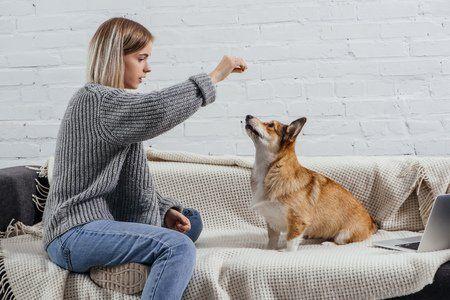Title: The Art of Corgi Training: Tail-Wagging Success
Introduction:
Corgis, with their delightful grins and unmistakable stature, have captured the hearts of dog lovers around the world. These pint-sized herders may be short in legs but are undeniably rich in personality, charm, and a boundless capacity for affection. However, like any breed, successful corgi ownership extends beyond the day-to-day cuddles and playtime; it requires a thoughtful and engaging approach to training. In this article, we’ll explore the ins and outs of corgi training, providing insights on techniques that can transform your eager pup into a well-mannered companion. From overcoming stubbornness to channeling their intelligence, join us on a journey into the world of corgi training, where patience and positivity blend seamlessly with tail-wagging enthusiasm.
Table of Contents
- Understanding Corgi Temperament for Effective Training
- Essential Techniques for Positive Reinforcement in Corgi Training
- Common Challenges in Corgi Training and How to Overcome Them
- Creating a Structured Training Schedule for Your Corgis Success
- Q&A
- The Conclusion
Understanding Corgi Temperament for Effective Training
When embarking on the journey of training a Corgi, it is essential to first grasp the unique temperament of this cheerful breed. Corgis are known for their intelligence and playfulness, which can make training both a delightful and challenging experience. These dogs possess a natural curiosity and a strong desire to engage with their surroundings. Understanding their temperament allows you to tailor your training methods to harness their energy and attention, ultimately making sessions more productive and enjoyable. Consider the following traits:
- Affectionate: Corgis thrive on human interaction and are motivated by praise and rewards.
- Independent: They may showcase stubbornness at times, requiring patience and consistency.
- Social: Early socialization is crucial; Corgis generally get along well with other pets and people.
Training methods that suit a Corgi’s personality are not only effective but also encourage a strong bond between you and your pet. Employing positive reinforcement techniques, such as treats and verbal praise, can significantly enhance their learning experience. The goal is to create an atmosphere where the Corgi feels comfortable and motivated to participate. To illustrate the key aspects of the training process, here’s a simple table highlighting beneficial training strategies:
| Training Strategy | Benefits |
|---|---|
| Positive Reinforcement | Encourages good behavior and builds trust. |
| Short, Frequent Sessions | Keeps the dog’s attention and prevents boredom. |
| Interactive Games | Combines fun with learning, perfect for their playful nature. |
Essential Techniques for Positive Reinforcement in Corgi Training
When training your corgi, using positive reinforcement can create a fun and effective learning environment. The key to successful reinforcement lies in timing, consistency, and choosing the right rewards. You can enhance the training experience by incorporating these essential techniques:
- Immediate Praise: Always reward your corgi instantly after they perform the desired action. This helps them connect the behavior with the reward.
- Variety of Rewards: Utilize a mix of treats, playtime, and verbal praise to keep your corgi engaged and motivated.
- Short Sessions: Keep training sessions brief but focused, around 5-10 minutes each. Corgis can lose interest quickly, so frequent short bursts are more effective.
- Target Training: Teach your corgi to touch a specific target with their nose or paw as a way to encourage other behaviors.
Tracking your corgi’s progress is equally important in ensuring effective training outcomes. Create a simple progress chart that highlights the behaviors learned, rewards given, and any challenges encountered. This will not only help you stay organized but also motivate you with visible improvement:
| Behavior | Date Learned | Reward Given | Notes |
|---|---|---|---|
| Sit | 10/01/2023 | Treat + Praise | Quick learner, enjoys treats |
| Stay | 10/05/2023 | Playtime | Needs extra patience |
| Come | 10/10/2023 | Treat | Responds well to calls |
Common Challenges in Corgi Training and How to Overcome Them
Training a Corgi can be a delightful yet challenging experience, as these intelligent and spirited dogs have a mind of their own. Common hurdles often include stubbornness, short attention spans, and a tendency towards excessive barking. To tackle these issues, it’s crucial to employ positive reinforcement techniques by rewarding desirable behaviors with treats and praise. Establishing a consistent routine while incorporating short, engaging training sessions can help keep your Corgi focused. Additionally, redirecting barking with specific commands such as “quiet” will aid in managing their vocal tendencies effectively.
Another challenge trainers face is the Corgi’s natural herding instinct, which may lead them to chase after other animals or even children. This behavior can be mitigated by teaching them strong recall commands and utilizing leash training. Enriching their environment with puzzle toys and mental stimulation can also help channel their energy positively. Below is a simple table showcasing effective training strategies:
| Challenge | Solution |
|---|---|
| Stubbornness | Use positive reinforcement |
| Short Attention Span | Keep sessions brief and fun |
| Excessive Barking | Teach “quiet” command |
| Herding Instinct | Focus on recall training |
Creating a Structured Training Schedule for Your Corgis Success
To set your Corgi up for success, establishing a structured training schedule is essential. This schedule should incorporate a variety of elements to ensure a comprehensive learning experience. Focus on the following areas to create a well-rounded training regimen:
- Duration: Each training session should last between 5 to 15 minutes, depending on your Corgi’s attention span.
- Frequency: Aim for at least 2 to 3 sessions each day to reinforce learning.
- Variety: Rotate commands and tricks to keep your Corgi engaged. Include obedience training, agility exercises, and socialization activities.
- Rewards: Use positive reinforcement methods, such as treats, praise, or playtime, to encourage good behavior.
Moreover, consistency is key in your training schedule. To aid your training journey, consider the following table of suggested training themes for each day:
| Day | Training Focus | Activity |
|---|---|---|
| Monday | Basic Commands | Practice sit, stay, and come using treats. |
| Tuesday | Leash Walking | Short walks focusing on loose leash training. |
| Wednesday | Agility | Introduce simple obstacles for navigation. |
| Thursday | Socialization | Playdates with other dogs. |
| Friday | Fun Tricks | Teach high-five or roll over using rewards. |
Q&A
Q&A: Corgi Training
Q1: Why is it important to train my corgi?
A1: Training your corgi is essential for fostering a well-behaved companion. Corgis are intelligent and eager to please, which means they thrive on learning new commands and tricks. Training helps strengthen the bond between you and your furry friend, discourages undesirable behaviors, and prepares them for a happy life in various environments.
Q2: At what age should I start training my corgi?
A2: The sooner, the better! You can start basic training as early as 8 weeks old. At this age, corgis are like little sponges, soaking up knowledge and social experiences. Basic commands, puppy socialization, and potty training should be your focus. Even older corgis can learn new tricks, so it’s never too late to start!
Q3: What are some essential commands every corgi should learn?
A3: Essential commands include “sit,” “stay,” “come,” “down,” and “leave it.” These foundational commands ensure safety and facilitate effective communication between you and your corgi. Additionally, teaching tricks like “roll over” or “shake” can be fun for both you and your dog!
Q4: What methods work best for training my corgi?
A4: Positive reinforcement is the most effective approach for training corgis. Treats, praise, and playtime are fantastic motivators. Corgis respond well to rewards, so immediately rewarding them for good behavior creates positive associations. Consistency, patience, and short training sessions will keep your corgi engaged and excited to learn.
Q5: How can I solve common behavioral issues while training?
A5: Common issues such as excessive barking, nipping, or stubbornness can often be addressed through consistent training. Redirect unwanted behaviors by providing an alternative or engaging them with toys. Implementing a structured routine can help mitigate issues, as corgis thrive on predictability. If problems persist, consider enlisting a professional trainer for personalized guidance.
Q6: How can I ensure my corgi stays focused during training?
A6: Corgis have a reputation for being easily distracted, but you can enhance their focus with a few strategies. Choose a quiet training environment away from distractions, use high-value treats, and keep sessions short—around 5-10 minutes—to maintain their attention. Engaging in regular exercise before training can also help burn off excess energy, making them more receptive to learning.
Q7: Are there specific socialization tips for corgis?
A7: Yes! Socialization is crucial, especially for puppies. Organize playdates with other friendly dogs, visit dog parks, and expose your corgi to various environments, sounds, and people. Pay attention to their reactions, and reward calm behavior. The goal is to help your corgi become a well-adjusted adult dog who is comfortable in different social situations.
Q8: How can I keep my corgi’s training routine fun and engaging?
A8: Incorporate play and interactive activities to keep training enjoyable. Use toys, puzzles, and games that challenge their minds. Vary your training techniques and locations to add excitement. Additionally, consider enrolling in agility or obedience classes where your corgi can learn alongside other dogs while having a blast!
Q9: Can I train my corgi to participate in dog sports?
A9: Absolutely! Corgis are agile and energetic, making them excellent candidates for dog sports like agility, herding, or obedience competitions. Start with basic obedience training and gradually introduce them to sport-specific skills. Participating in dog sports can provide you and your corgi with a fulfilling and enriching experience.
Q10: What’s the best piece of advice for new corgi owners?
A10: Enjoy the journey! Corgis are clever, loving, and full of personality. Embrace their quirks and be patient with the training process. Celebrate the small wins, and remember that the bond you’re building is what truly matters. Consistency, love, and a sprinkle of fun will lead to a well-trained and happy corgi.
The Conclusion
As we wrap up our exploration of corgi training, it’s clear that these spirited little dogs have a world of potential waiting to be unleashed. Their playful natures and keen intelligence make them eager learners, ready to engage with the training methods we’ve discussed. Remember, patience and consistency are your best allies on this journey, as every corgi learns at their own pace. Whether you’re tackling basic commands or embarking on advanced tricks, the bond you forge through training will only deepen your connection with your furry companion. So grab those treats, put on your training hat, and embark on this rewarding adventure—it’s not just about teaching your corgi; it’s about growing together and making memories that will last a lifetime. Happy training!



